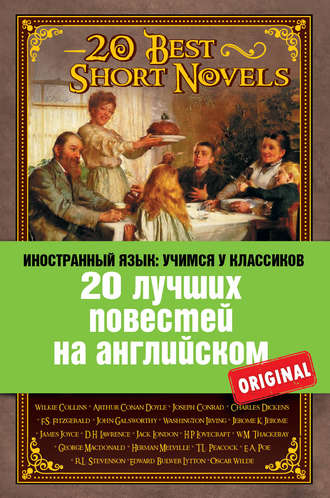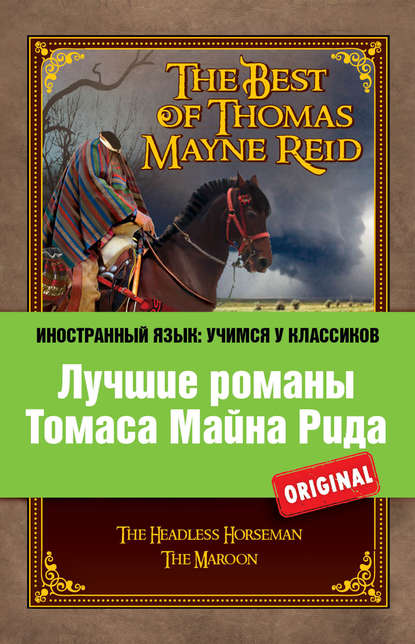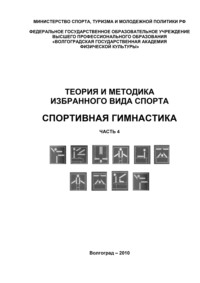
Полная версия
20 лучших повестей на английском / 20 Best Short Novels
‘“You dog!” I said; “I have hunted you from Salt Lake City to St. Petersburg, and you have always escaped me. Now, at last your wanderings have come to an end, for either you or I shall never see to-morrow’s sunrise.” He shrunk still farther away as I spoke, and I could see on his face that he thought I was mad. So I was for the time. The pulses in my temples beat like sledge-hammers, and I believe I would have had a fit of some sort if the blood had not gushed from my nose and relieved me.
‘“What do you think of Lucy Ferrier now?” I cried, locking the door, and shaking the key in his face. “Punishment has been slow in coming, but it has overtaken you at last.” I saw his coward lips tremble as I spoke. He would have begged for his life, but he knew well that it was useless.
‘“Would you murder me?” he stammered.
‘“There is no murder,” I answered. “Who talks of murdering a mad dog? What mercy had you upon my poor darling, when you dragged her from her slaughtered father, and bore her away to your accursed and shameless harem?”
‘“It was not I who killed her father,” he cried.
‘“But it was you who broke her innocent heart,” I shrieked, thrusting the box before him. “Let the high God judge between us. Choose and eat. There is death in one and life in the other. I shall take what you leave. Let us see if there is justice upon the earth, or if we are ruled by chance.”
‘He cowered away with wild cries and prayers for mercy, but I drew my knife and held it to his throat until he had obeyed me. Then I swallowed the other, and we stood facing one another in silence for a minute or more, waiting to see which was to live and which was to die. Shall I ever forget the look which came over his face when the first warning pangs told him that the poison was in his system? I laughed as I saw it, and held Lucy’s marriage ring in front of his eyes. It was but for a moment, for the action of the alkaloid is rapid. A spasm of pain contorted his features; he threw his hands out in front of him, staggered, and then, with a hoarse cry, fell heavily upon the floor. I turned him over with my foot, and placed my hand upon his heart. There was no movement. He was dead!
‘The blood had been streaming from my nose, but I had taken no notice of it. I don’t know what it was that put it into my head to write upon the wall with it. Perhaps it was some mischievous idea of setting the police upon a wrong track, for I felt light-hearted and cheerful. I remembered a German being found in New York with RACHE written up above him, and it was argued at the time in the newspapers that the secret societies must have done it. I guessed that what puzzled the New Yorkers would puzzle the Londoners, so I dipped my finger in my own blood and printed it on a place on the wall. Then I walked down to my cab and found that there was nobody about, and that the night was still very wild. I had driven some distance, when I put my hand into the pocket in which I usually kept Lucy’s ring, and found that it was not there. I was thunderstruck at this, for it was the only memento that I had of her. Thinking that I might have dropped it when I stooped over Drebber’s body, I drove back, and leaving my cab in a side street, I went boldly up to the house – for I was ready to dare anything rather than lose the ring. When I arrived there, I walked right into the arms of a police-officer who was coming out, and only managed to disarm his suspicions by pretending to be hopelessly drunk.
‘That was how Enoch Drebber came to his end. All I had to do then was to do as much for Stangerson, and so pay off John Ferrier’s debt. I knew that he was staying at Halliday’s Private Hotel, and I hung about all day, but he never came out. I fancy that he suspected something when Drebber failed to put in an appearance. He was cunning, was Stangerson, and always on his guard. If he thought he could keep me off by staying indoors he was very much mistaken. I soon found out which was the window of his bedroom, and early next morning I took advantage of some ladders which were lying in the lane behind the hotel, and so made my way into his room in the grey of the dawn. I woke him up and told him that the hour had come when he was to answer for the life he had taken so long before. I described Drebber’s death to him, and I gave him the same choice of the poisoned pills. Instead of grasping at the chance of safety which that offered him, he sprang from his bed and flew at my throat. In self-defence I stabbed him to the heart. It would have been the same in any case, for Providence would never have allowed his guilty hand to pick out anything but the poison.
‘I have little more to say, and it’s as well, for I am about done up. I went on cabbing it for a day or so, intending to keep at it until I could save enough to take me back to America. I was standing in the yard when a ragged youngster asked if there was a cabby there called Jefferson Hope, and said that his cab was wanted by a gentleman at 221B, Baker Street. I went round suspecting no harm, and the next thing I knew, this young man here had the bracelets on my wrists, and as neatly shackled as ever I saw in my life. That’s the whole of my story, gentlemen. You may consider me to be a murderer; but I hold that I am just as much an officer of justice as you are.’
So thrilling had the man’s narrative been and his manner was so impressive that we had sat silent and absorbed. Even the professional detectives, blasé[142] as they were in every detail of crime, appeared to be keenly interested in the man’s story. When he finished, we sat for some minutes in a stillness which was only broken by the scratching of Lestrade’s pencil as he gave the finishing touches to his shorthand account.
‘There is only one point on which I should like a little more information,’ Sherlock Holmes said at last. ‘Who was your accomplice who came for the ring which I advertised?’
The prisoner winked at my friend jocosely. ‘I can tell my own secrets,’ he said, ‘but I don’t get other people into trouble. I saw your advertisement, and I thought it might be a plant, or it might be the ring which I wanted. My friend volunteered to go and see. I think you’ll own he did it smartly.’
‘Not a doubt of that,’ said Holmes heartily.
‘Now, gentlemen,’ the inspector remarked, gravely, ‘the forms of the law must be complied with. On Thursday the prisoner will be brought before the magistrates, and your attendance will be required. Until then I will be responsible for him.’ He rang the bell as he spoke, and Jefferson Hope was led off by a couple of warders, while my friend and I made our way out of the station and took a cab back to Baker Street.
Chapter VII
The conclusion
We had all been warned to appear before the magistrates upon the Thursday; but when the Thursday came there was no occasion for our testimony. A higher Judge had taken the matter in hand, and Jefferson Hope had been summoned before a tribunal where strict justice would be meted out to him. On the very night after his capture the aneurism burst, and he was found in the morning stretched upon the floor of the cell, with a placid smile upon his face, as though he had been able in his dying moments to look back upon a useful life, and on work well done.
‘Gregson and Lestrade will be wild about his death,’ Holmes remarked, as we chatted it over next evening. ‘Where will their grand advertisement be now?’
‘I don’t see that they had very much to do with his capture,’ I answered.
‘What you do in this world is a matter of no consequence,’ returned my companion bitterly. ‘The question is, what can you make people believe that you have done? Never mind,’ he continued, more brightly, after a pause. ‘I would not have missed the investigation for anything. There has been no better case within my recollection. Simple as it was, there were several most instructive points about it.’
‘Simple!’ I ejaculated.
‘Well, really, it can hardly be described as otherwise,’ said Sherlock Holmes, smiling at my surprise. ‘The proof of its intrinsic simplicity is, that without any help save a few very ordinary deductions I was able to lay my hand upon the criminal within three days.’
‘That is true,’ said I.
‘I have already explained to you that what is out of the common is usually a guide rather than a hindrance. In solving a problem of this sort, the grand thing is to be able to reason backwards. That is a very useful accomplishment, and a very easy one, but people do not practice it much. In the every-day affairs of life it is more useful to reason forwards, and so the other comes to be neglected. There are fifty who can reason synthetically for one who can reason analytically.’
‘I confess,’ said I, ‘that I do not quite follow you.’
‘I hardly expected that you would. Let me see if I can make it clearer. Most people, if you describe a train of events to them, will tell you what the result would be. They can put those events together in their minds, and argue from them that something will come to pass. There are few people, however, who, if you told them a result, would be able to evolve from their own inner consciousness what the steps were which led up to that result. This power is what I mean when I talk of reasoning backwards, or analytically.’
‘I understand,’ said I.
‘Now this was a case in which you were given the result and had to find everything else for yourself. Now let me endeavour to show you the different steps in my reasoning. To begin at the beginning. I approached the house, as you know, on foot, and with my mind entirely free from all impressions. I naturally began by examining the roadway, and there, as I have already explained to you, I saw clearly the marks of a cab, which, I ascertained by inquiry, must have been there during the night. I satisfied myself that it was a cab and not a private carriage by the narrow gauge of the wheels. The ordinary London growler[143] is considerable less wide than a gentleman’s brougham[144].
‘This was the first point gained. I then walked slowly down the garden path, which happened to be composed of a clay soil, peculiarly suitable for taking impressions. No doubt it appeared to you to be a mere trampled line of slush, but to my trained eyes every mark upon its surface had a meaning. There is no branch of detective science which is so important and so much neglected as the art of tracing footsteps. Happily, I have always laid great stress upon it, and much practice has made it second nature to me. I saw the heavy footmarks of the constables, but I saw also the track of the two men who had first passed through the garden. It was easy to tell that they had been before the others, because in places their marks had been entirely obliterated by the others coming upon the top of them. In this way my second link was formed, which told me that the nocturnal visitors were two in number, one remarkable for his height (as I calculated from the length of his stride), and the other fashionably dressed, to judge from the small and elegant impression left by his boots.
‘On entering the house this last inference was confirmed. My well-booted man lay before me. The tall one, then, had done the murder, if murder there was. There was no wound upon the dead man’s person, but the agitated expression upon his face assured me that he had foreseen his fate before it came upon him. Men who die from heart disease, or any sudden natural cause, never by any chance exhibit agitation upon their features. Having sniffed the dead man’s lips, I detected a slightly sour smell, and I came to the conclusion that he had had poison forced upon him. Again, I argued that it had been forced upon him from the hatred and fear expressed upon his face. By the method of exclusion, I had arrived at this result, for no other hypothesis would meet the facts. Do not imagine that it was a very unheard-of idea. The forcible administration of poison is by no means a new thing in criminal annals. The cases of Dolsky in Odessa, and of Leturier in Montpellier[145], will occur at once to any toxicologist.
‘And now came the great question as to the reason why. Robbery had not been the object of the murder, for nothing was taken. Was it politics, then, or was it a woman? That was the question which confronted me. I was inclined from the first to the latter supposition. Political assassins are only too glad to do their work and to fly. This murder had, on the contrary, been done most deliberately, and the perpetrator had left his tracks all over the room, showing that he had been there all the time. It must have been a private wrong, and not a political one, which called for such a methodical revenge. When the inscription was discovered upon the wall, I was more inclined than ever to my opinion. The thing was too evidently a blind. When the ring was found, however, it settled the question. Clearly the murderer had used it to remind his victim of some dead or absent woman. It was at this point that I asked Gregson whether he had inquired in his telegram to Cleveland as to any particular point in Mr. Drebber’s former career. He answered, you remember, in the negative.
‘I then proceeded to make a careful examination of the room, which confirmed me in my opinion as to the murderer’s height, and furnished me with the additional details as to the Trichinopoly cigar and the length of his nails. I had already come to the conclusion, since there were no signs of a struggle, that the blood which covered the floor had burst from the murderer’s nose in his excitement. I could perceive that the track of blood coincided with the track of his feet. It is seldom that any man, unless he is very full-blooded, breaks out in this way through emotion, so I hazarded the opinion that the criminal was probably a robust and ruddy-faced man. Events proved that I had judged correctly.
‘Having left the house, I proceeded to do what Gregson had neglected. I telegraphed to the head of the police at Cleveland, limiting my inquiry to the circumstances connected with the marriage of Enoch Drebber. The answer was conclusive. It told me that Drebber had already applied for the protection of the law against an old rival in love, named Jefferson Hope, and that this same Hope was at present in Europe. I knew now that I held the clue to the mystery in my hand, and all that remained was to secure the murderer.
‘I had already determined in my own mind that the man who had walked into the house with Drebber was none other than the man who had driven the cab. The marks in the road showed me that the horse had wandered on in a way which would have been impossible had there been any one in charge of it. Where, then, could the driver be, unless he were inside the house? Again, it is absurd to suppose that any sane man would carry out a deliberate crime under the very eyes as it were, of a third person, who was sure to betray him. Lastly, supposing one man wished to dog another through London, what better means could he adopt than to turn cabdriver. All these considerations led me to the irresistible conclusion that Jefferson Hope was to be found among the jarveys of the Metropolis.
‘If he had been one, there was no reason to believe that he had ceased to be. On the contrary, from his point of view, any sudden change would be likely to draw attention to himself. He would probably, for a time at least, continue to perform his duties. There was no reason to suppose that he was going under an assumed name. Why should he change his name in a country where no one knew his original one? I therefore organized my Street Arab detective corps, and sent them systematically to every cab proprietor in London until they ferreted out the man that I wanted. How well they succeeded, and how quickly I took advantage of it, are still fresh in your reflection. The murder of Stangerson was an incident which was entirely unexpected, but which could hardly in any case have been prevented. Through it, as you know, I came into possession of the pills, the existence of which I had already surmised. You see, the whole thing is a chain of logical sequence without a break or flaw.’
‘It is wonderful!’ I cried. ‘Your merits should be publicly recognized. You should publish an account of the case. If you won’t, I will for you.’
‘You may do what you like, Doctor,’ he answered. ‘See here!’ he continued, handing a paper over to me, ‘look at this!’
It was the Echo for the day, and the paragraph to which he pointed was devoted to the case in question.
‘The public,’ it said, ‘have lost a sensational treat through the sudden death of the man Hope, who was suspected of the murder of Mr. Enoch Drebber and of Mr. Joseph Stangerson. The details of the case will probably be never known now, though we are informed upon good authority that the crime was the result of an old-standing and romantic feud, in which love and Mormonism bore a part. It seems that both the victims belonged, in their younger days, to the Latter Day Saints, and Hope, the deceased prisoner, hails also from Salt Lake City. If the case has had no other effect, it, at least, brings out in the most striking manner the efficiency of our detective police force, and will serve as a lesson to all foreigners that they will do wisely to settle their feuds at home, and not to carry them on to British soil. It is an open secret that the credit of this smart capture belongs entirely to the well-known Scotland Yard officials, Messrs. Lestrade and Gregson. The man was apprehended, it appears, in the rooms of a certain Mr. Sherlock Holmes, who has himself, as an amateur, shown some talent in the detective line and who, with such instructors, may hope in time to attain to some degree of their skill. It is expected that a testimonial of some sort will be presented to the two officers as a fitting recognition of their services.’
‘Didn’t I tell you so when we started?’ cried Sherlock Holmes with a laugh. ‘That’s the result of all our Study in Scarlet: to get them a testimonial!’
‘Never mind,’ I answered; ‘I have all the facts in my journal, and the public shall know them. In the meantime you must make yourself contented by the consciousness of success, like the Roman miser —
“Populus me sibilat, at mihi plaudoIpse domi simul ac nummos contemplar in arca.[146]”’Joseph Conrad
Heart of Darkness
I
The Nellie, a cruising yawl[147], swung to her anchor without a flutter of the sails, and was at rest. The flood had made, the wind was nearly calm, and being bound down the river, the only thing for it was to come to and wait for the turn of the tide.
The sea-reach of the Thames stretched before us like the beginning of an interminable waterway. In the offing the sea and the sky were welded together without a joint, and in the luminous space the tanned sails of the barges drifting up with the tide seemed to stand still in red clusters of canvas sharply peaked, with gleams of varnished sprits. A haze rested on the low shores that ran out to sea in vanishing flatness. The air was dark above Gravesend, and farther back still seemed condensed into a mournful gloom, brooding motionless over the biggest, and the greatest town on earth.
The Director of Companies was our captain and our host. We four affectionately watched his back as he stood in the bows looking to seaward. On the whole river there was nothing that looked half so nautical. He resembled a pilot, which to a seaman is trustworthiness personified. It was difficult to realize his work was not out there in the luminous estuary, but behind him, within the brooding gloom.
Between us there was, as I have already said somewhere, the bond of the sea. Besides holding our hearts together through long periods of separation, it had the effect of making us tolerant of each other’s yarns – and even convictions. The Lawyer – the best of old fellows – had, because of his many years and many virtues, the only cushion on deck, and was lying on the only rug. The Accountant had brought out already a box of dominoes, and was toying architecturally with the bones. Marlow sat cross-legged right aft, leaning against the mizzen-mast. He had sunken cheeks, a yellow complexion, a straight back, an ascetic aspect, and, with his arms dropped, the palms of hands outwards, resembled an idol. The director, satisfied the anchor had good hold, made his way aft and sat down amongst us. We exchanged a few words lazily. Afterwards there was silence on board the yacht. For some reason or other we did not begin that game of dominoes. We felt meditative, and fit for nothing but placid staring. The day was ending in a serenity of still and exquisite brilliance. The water shone pacifically; the sky, without a speck, was a benign immensity of unstained light; the very mist on the Essex marsh was like a gauzy and radiant fabric, hung from the wooded rises inland, and draping the low shores in diaphanous folds. Only the gloom to the west, brooding over the upper reaches, became more sombre every minute, as if angered by the approach of the sun.
And at last, in its curved and imperceptible fall, the sun sank low, and from glowing white changed to a dull red without rays and without heat, as if about to go out suddenly, stricken to death by the touch of that gloom brooding over a crowd of men.
Forthwith a change came over the waters, and the serenity became less brilliant but more profound. The old river in its broad reach rested unruffled at the decline of day, after ages of good service done to the race that peopled its banks, spread out in the tranquil dignity of a waterway leading to the uttermost ends of the earth. We looked at the venerable stream not in the vivid flush of a short day that comes and departs for ever, but in the august light of abiding memories. And indeed nothing is easier for a man who has, as the phrase goes, ‘followed the sea’ with reverence and affection, than to evoke the great spirit of the past upon the lower reaches of the Thames. The tidal current runs to and fro in its unceasing service, crowded with memories of men and ships it had borne to the rest of home or to the battles of the sea. It had known and served all the men of whom the nation is proud, from Sir Francis Drake to Sir John Franklin, knights all, titled and untitled – the great knights-errant of the sea. It had borne all the ships whose names are like jewels flashing in the night of time, from the Golden Hind returning with her rotund flanks full of treasure, to be visited by the Queen’s Highness and thus pass out of the gigantic tale, to the Erebus and Terror, bound on other conquests – and that never returned. It had known the ships and the men. They had sailed from Deptford[148], from Greenwich[149], from Erith[150] – the adventurers and the settlers; kings’ ships and the ships of men on ’Change; captains, admirals, the dark ‘interlopers’ of the Eastern trade, and the commissioned ‘generals’ of East India fleets. Hunters for gold or pursuers of fame, they all had gone out on that stream, bearing the sword, and often the torch, messengers of the might within the land, bearers of a spark from the sacred fire. What greatness had not floated on the ebb of that river into the mystery of an unknown earth! . . . The dreams of men, the seed of commonwealths, the germs of empires.
The sun set; the dusk fell on the stream, and lights began to appear along the shore. The Chapman light-house, a three-legged thing erect on a mud-flat, shone strongly. Lights of ships moved in the fairway – a great stir of lights going up and going down. And farther west on the upper reaches the place of the monstrous town was still marked ominously on the sky, a brooding gloom in sunshine, a lurid glare under the stars.
‘And this also,’ said Marlow suddenly, ‘has been one of the dark places of the earth.’
He was the only man of us who still ‘followed the sea.’ The worst that could be said of him was that he did not represent his class. He was a seaman, but he was a wanderer, too, while most seamen lead, if one may so express it, a sedentary life. Their minds are of the stay-at-home order, and their home is always with them – the ship; and so is their country – the sea. One ship is very much like another, and the sea is always the same. In the immutability of their surroundings the foreign shores, the foreign faces, the changing immensity of life, glide past, veiled not by a sense of mystery but by a slightly disdainful ignorance; for there is nothing mysterious to a seaman unless it be the sea itself, which is the mistress of his existence and as inscrutable as Destiny. For the rest, after his hours of work, a casual stroll or a casual spree on shore suffices to unfold for him the secret of a whole continent, and generally he finds the secret not worth knowing. The yarns of seamen have a direct simplicity, the whole meaning of which lies within the shell of a cracked nut. But Marlow was not typical (if his propensity to spin yarns be excepted), and to him the meaning of an episode was not inside like a kernel but outside, enveloping the tale which brought it out only as a glow brings out a haze, in the likeness of one of these misty halos[151] that sometimes are made visible by the spectral illumination of moonshine.














